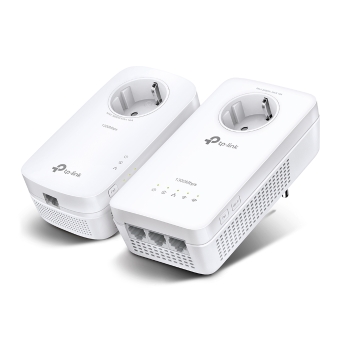How to customize Powerline ac Extender's wireless settings via web-based management interface (new logo)
The powerline extender’s wireless network name (SSID) and password, and security option are preset in the factory. The preset SSID and password can be found on the product label and Wi-Fi Info Card. You can customize the wireless settings according to your needs.
Here takes TL-WPA9610 as demonstration:
To log into the web-based management interface, please refer to How to log into the web-based management interface of Powerline ac Extender (new logo)?
Go to Wireless > Settings page.
To enable or disable the wireless function:
Select the box to enable the wireless Radio of 2.4GHz or 5GHz. Deselect the box to disable wireless function. If disabled, all wireless settings will be ineffective.

To change the wireless network name (SSID) and wireless password:
The default SSID is TP-LINK_XXXX for 2.4GHz network and TP-LINK_XXXX_5G for 5GHz network, and the default password is printed on the Wi-Fi Info Card. You can change the default ones by directly entering new ones in the field. SSID is up to 32 characters, and the value in both SSID and password is case-sensitive.
Note:
Remember to write down the new SSID and password, for you may be disconnected when new settings are effective.

To hide SSID:
Select Hide SSID, and your SSID will not be broadcasted. It won’t display when you scan for local wireless network list on your wireless device and you need to manually join the network.

To have more advanced settings:
Click Advanced below Password to have more advanced settings.


Security: Select an option from the Security drop-down list. The extender provides three options, No Security, WPA/WPA2 Personal (Recommended), and WEP. WPA2 uses the newest standard and the security level is the highest. We don’t recommend you to change the default settings unless necessary.
Mode: Select the desired mode.
• 802.11n only: Select only if all of your wireless clients are 802.11n devices.
• 802.11g/n mixed: Select if you are using both 802.11g and 802.11n wireless clients.
• 802.11b/g/n mixed: Select if you are using a mix of 802.11b, 11g, and 11n wireless clients.
Note: When 802.11n only mode is selected, only 802.11n wireless clients can connect to the extender.
It is strongly recommended that you select 802.11b/g/n mixed, and all of 802.11b, 802.11g, and 802.11n wireless clients can connect to the extender.
• 802.11ac only (5GHz): Select only if all of your wireless clients are 802.11ac devices.
• 802.11n/ac mixed (5Ghz): Select if you are using both 802.11n and 802.11ac wireless clients.
• 802.11a/n/ac mixed (5Ghz): Select if you are using a mix of 802.11ac, 802.11n and 802.11ac wireless clients. It is strongly recommended that you select 11a/n/ac mixed.
Channel Width: Select the channel width. The default setting is Auto, which can adjust the channel width for your clients automatically.
Channel: Select the channel you want to use from the drop-down list. This field determines which operating frequency will be used. It is not necessary to change the wireless channel unless you notice interference problems with another nearby access point.
Transmit Power: Select the level of transmit power. We recommend you choose High to have the best signal strength.
Get to know more details of each function and configuration please go to Download Center to download the manual of your product.
Is this faq useful?
Your feedback helps improve this site.
TP-Link Community
Still need help? Search for answers, ask questions, and get help from TP-Link experts and other users around the world.


